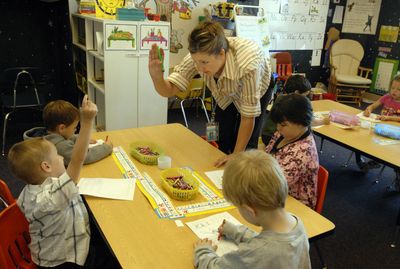Prepared, ready to learn
At Trent Elementary, all-day kindergarten has been a success for students, parents

The full-day kindergarten at Trent Elementary School is the first of its kind in the East Valley district and has been a rousing success on many fronts, school officials say.
Students come into first grade better prepared and ready to learn, school data shows. Low-income parents don’t have to worry about finding day care to supplement half-day classes. And teachers get more time to teach students the important building blocks of their education.
There are four classes at the school in a program paid for by the state, which is targeting schools with high numbers of students who qualify for free or reduced-price lunch. Ninety percent of students at Trent fall into that category.
The school has a lot of data to point to the gains the students are making, even though this is only the second year of the program. In 2007 only seven of 92 kindergarten students advanced to unit 10 in the district’s Read Well program. Last year 23 students made it to unit 10 or higher.
The average number of students with letter-naming fluency also has seen big increases. “We see some definite gains there,” said Principal Kyle Rydell. “They’re doing a lot better in their reading.”
The gains are not just in classroom work. The kindergarteners are in the school all day instead of just two or three hours, so they know procedures better. Last year’s first class of full-day kindergarteners have settled into first grade a lot more smoothly than previous groups. “They’re not tired,” Rydell said. “They know the routine. They’ve just seemed to fit in.”
The students also have spent more time learning. “The old days of kindergarten being the transition from home to first grade is no longer,” he said. “When they leave, they’re reading. We’re not wasting that year anymore.”
Teacher Mary Melby, in her second year of teaching full-day kindergarten, sees a big difference in her students. They have quickly learned how to settle down and work quietly. “At this point to have that is phenomenal,” she said. “Usually it takes four to six months.
“I can really see the kids come around. By the end of March, they’re acting like first-graders.”
A lot of the kindergarten experience is still about learning how to interact with other students. “That’s what kindergarten is for the first six months, learning how to get along and learn the rules,” Melby said.
The program has been such a success that the district would like to expand it to its other elementary schools, but no more money has been forthcoming from the state. No one wants to think of the possibility that the existing money might be lost. “It’s all about funding,” Rydell said. “We’re crossing our fingers. It would be sad to go backward.”
Jan Beauchamp, assistant superintendent for academics, is hopeful the program will continue. “As far as we know, it will continue for the schools that currently have all-day kindergarten,” she said. “What didn’t happen this year is expansion of all-day kindergarten to other schools.”
The program was designed as a phase-in model, slowly expanding every year to include more schools. “They started funding the schools with the highest rate of free and reduced lunch participation first,” she said. “We’ll continue tracking the progress.”